Human skin is very sensitive and susceptible, often exposed to the negative effects of various factors. Dryness is one of the common problems that requires immediate treatment. This phenomenon can be either congenital or acquired during life. Dry skin causes significant discomfort: peeling, pigmentation, hardness and severe itching. If you do not get rid of unpleasant sensations in time, the situation will only get worse.
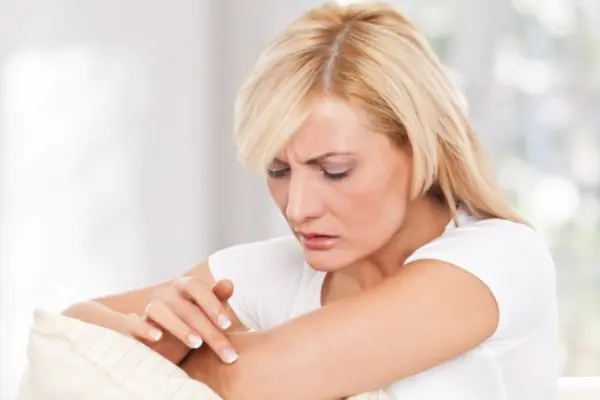
Causes of dry and itchy skin
The causes of dry skin and itching may vary. They depend on changes in the environment, as well as pathological processes within the body. The most common reasons include:
- The use of cosmetic products with surfactants (surfactants), which can cause dehydration and some allergic reactions: from mild irritation to dermatitis.
- Damage to the epidermis during hot baths, as well as after visiting a swimming pool where the water is chlorinated and disinfected.
- The effect of dry air on the epidermis in rooms with air conditioning and heating devices, as a result of which the fatty protective film is destroyed.
- Unfavorable environmental conditions; negative effects of ultraviolet rays in the summer.
- Hormonal imbalance.
- Poor nutrition, lack of sufficient fluid in the diet, which leads to dehydration of the skin.
- Genetic predisposition.
- Skin diseases and pathologies of internal organs.
- Vitamin deficiency or excess vitamins.
- Long-term use of antibiotics and medications.
- Frequent stressful situations.
- Bad habits.
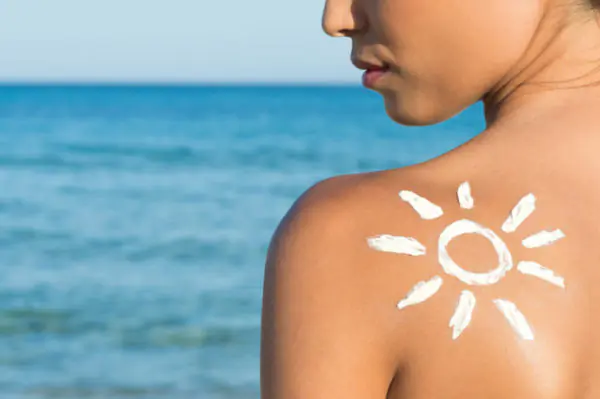
The danger of flaky and dry skin is that the risk of microtrauma increases. Through damaged areas, various infectious agents that can affect organs and systems easily penetrate into the body. In addition, the skin loses its attractive appearance: it becomes tense, wrinkles and other signs of premature aging appear.
What diseases cause dry skin?
Very often, various diseases become the cause of dry skin. In particular, such a situation may arise in the following diseases and situations:
- skin diseases of hereditary and acquired nature (dermatitis, psoriasis, herpes, ichthyosis, scaly lichen and others);
- chronic intoxication;
- dystrophy;
- diabetes;
- allergic reactions;
- renal failure;
- problems with the endocrine and digestive system;
- lack of thyroid hormones (hypothyroidism);
- hypovitaminosis;
- seborrhea;
- autoimmune disorders (Sjogren's disease).
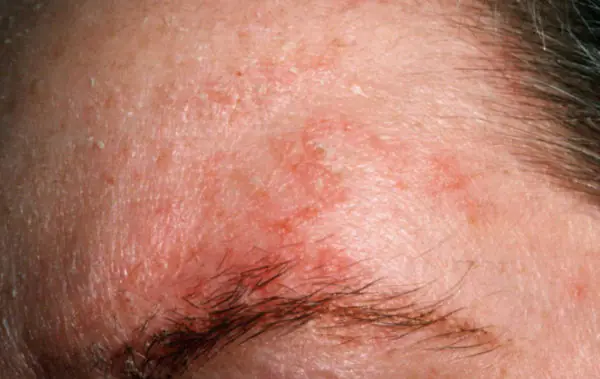
How to deal with dry skin: care products
It is advisable to eliminate any cosmetic defects and unpleasant sensations using an integrated approach. A dermatologist will help you choose the right method for treating dehydrated dermis.
Faced with this problem, many people prefer skin care products. They include:
- means for exfoliating dead cells (peelings, scrubs);
- products with natural ingredients (mineral oils, naturally occurring fats, such as glycerin, beeswax).
Peels and scrubs can be used no more than once a week, and the second group of products is suitable for daily use at any time of the day, but preferably before bed after hygiene procedures.
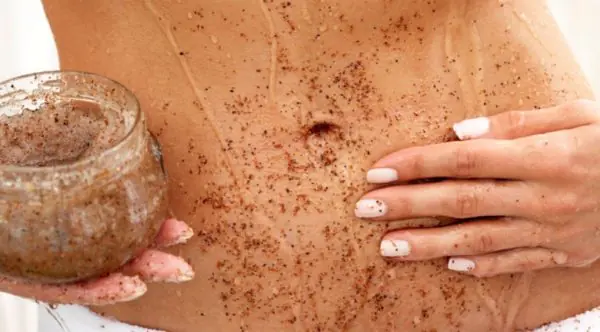
It is worth noting that oils are a good way to maintain moisture in the outer layers of the skin, and the effectiveness of lotions is enhanced by the fatty acids, ceramides (components of the skin barrier layer) and complex lipids they contain.
It is necessary to use protective cosmetics all year round in any weather. These can be balms against chapped lips in winter, lifting, smoothing masks, insect repellent sprays in the summer. We should not forget about the choice of clothing: it should be made from natural fabrics and be appropriate for the season.
Cold compresses, which dilate small arteries and relax muscles, as well as ointments based on hydrocortisone (a synthetic glucocorticosteroid drug) are highly effective.
Caring products actively eliminate itching, tingling and pulsation of the epidermis, not only cleanse it, but also stimulate the regeneration of damaged cells.
Recommendations from nutritionists

In order to speed up the effect of anti-itch medications, nutritionists give the following recommendations:
- Avoid crash diets. They lead to vitamin deficiency, a lack of nutrients in the body, chemical elements and organic compounds. This causes dry skin. You need to lose excess weight gradually to avoid sagging and stretch marks.
- Change your diet. Add foods containing vitamins A and E: dairy products, liver, buckwheat, carrots, cabbage, peas, greens, cabbage, black currants.
- Limit the intake of diuretics and drinking aids for weight loss. They remove more fluid from the body than normal, dehydrating it.
Pharmacy moisturizers
Many pharmaceutical companies offer their moisturizers against dry skin. Various preparations have been created for normal, sensitive, combination and other types of skin.
Moisturizers include lotions, cosmetic oils, creams, and milks. They help the skin, the largest organ, to systematically receive water and protect against the premature appearance of wrinkles.
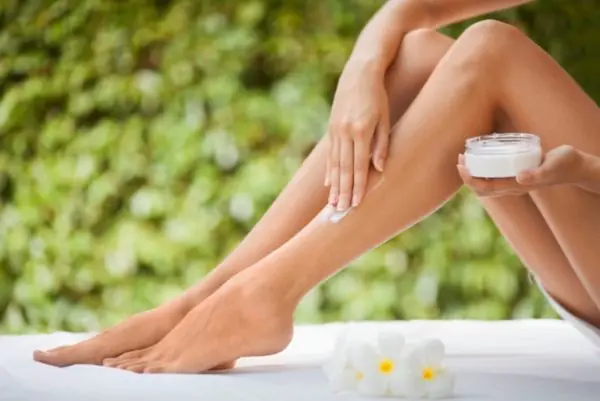
When choosing a product, you should focus on the following individual components:
Hydrant creams are popular. They have long become a basic remedy for people suffering from seasonal dry skin. Such creams bring water to the inner layers and nourish the cells with the necessary amount of liquid.
Particular attention should be paid to the composition of the moisturizer. Glycerin, water and chia seeds are the most important ingredients needed for intense hydration.
Traditional medicine recipes
Despite the innovations of modern medicine, folk remedies do not lose their relevance.
List of popular recipes:
- Mix avocado and banana crushed in a blender with 100 ml of cream and 100 grams of butter. Add rose essential oil. Apply to the itchy area for 20 minutes and rinse with warm water.
- Mix honey and olive oil in equal proportions. After 15 minutes, wash off.
- Grind the carrots, add oatmeal, and apply the resulting slurry for 15 minutes.
- In order to remove dryness on your hands, you need to apply mashed potatoes to them, wrapping them in plastic. To enhance the effect, you can add 1 tbsp. sour cream, yolk and lemon juice. Keep for 20 minutes.
- Apply 1-2 tsp to problem elbows. starch, pre-mixed with warm water. After the procedure, apply moisturizer.
By following these recommendations and using recipes, you can not be afraid of skin problems.
For what reasons does the skin of the body begin to itch and peel off? What to do with severe itching, flaking and dry skin. Review of traditional medicine.
Severe itching and flaking of the skin are the most characteristic symptoms of xerosis. In addition, the patient may experience a deterioration in the appearance of the skin: dullness, burning, redness of certain areas, and the appearance of wrinkles.
Causes of xerosis or excessive dry skin:
- malfunctions of internal organs;
- exposure to external adverse factors: hard water, dry climate, poor ecology;
- improper skin care.
Xerosis is not a sign of a serious health problem, however, it causes discomfort to its owner, and without treatment leads to unpleasant complications. To the great relief of patients, there are many ways to control the external and internal factors of its development, thereby protecting your skin from drying out.
External factors causing itching and flaking of the skin
Most often, dryness and severe itching of the skin (especially the face) plague people who spend a lot of time in the sun or often visit the solarium. To avoid negative consequences, you need to normalize your sunbathing schedule, and be sure to use sunscreen before and moisturizers after tanning.
The effects of low temperatures are no less harmful: in the cold, the skin actively loses moisture, so before each exit outside, you need to apply a rich, nourishing cream to exposed areas of the body.
Often the cause of dry skin is the abuse of scrubs and peels with aggressive components, as well as the constant use of alcohol-containing cosmetics. A double blow for the skin is to use soap after scrubbing.
You should not believe cosmetics manufacturers who claim that petroleum jelly and paraffin in the product actively moisturize the dermis. In fact, by creating a dense protective layer on the surface of the skin, they draw moisture from the deep layers of the dermis, causing the skin to itch and flake even more.
To prevent the skin from drying out and flaking, there should always be normal air humidity in the room. The less moisture there is, the more moisture will evaporate from the surface of the skin.
Too frequent bathing is also not good for the dermis, especially with constant use of soap, bath foam and shower gels.
By washing away the protective lipid layer on the skin, they thereby deprive it of protection and dry it out. In addition, it is worth remembering that swimming in sea water also leaves salts on the skin (this is the cause of “tight” skin), and they need to be washed off after each bathing session.
Internal factors
The number of pathologies, the symptoms of which may be peeling and intense skin itching, include:
- dangerous congenital diseases: psoriasis, ichthyosis;
- diseases of the gastrointestinal tract: stomach, pancreas, duodenum;
- predisposition to allergies;
- dry skin may indicate dysfunction of the pancreas or thyroid glands;
- metabolic disease;
- nervous disorders: migraine, stress, panic attacks, depression;
- vitamin deficiency and hypovitaminosis, in particular, acute lack of vitamins B, E and A;
- severe dehydration of the body caused by illness, excessive dry air in the room, or incorrect drinking regime (replacing clean drinking water with soda, coffee, and sweet drinks also leads to dehydration).
Treatment measures
To effectively treat xerosis, you need to find out for sure why the patient’s skin is peeling and itching. If the cause lies in systemic diseases, special treatment is prescribed.
In the vast majority of cases, itchy and flaky skin can be cured directly at home: using moisturizers with the addition of salicylic and lactic acid. Any moisturizer is applied to damp skin.
Moisturizers should contain humecants - special compounds that attract moisture. Humecanths can be film-forming and hygroscopic. Film-forming humecants contain mineral oils and natural fats (for example, beeswax), which form a film on the skin and thereby prevent moisture from evaporating from its surface. Hygroscopic products are saturated with hyaluronic acid and collagen.
To relieve discomfort, your doctor may recommend an antipruritic ointment: Fenistil, Mesoderm or Elidel. Particularly strong corticosteroids: Triderm, Advantan, Elokom, Celestoderm B with Garamycin (containing antibiotics), are prescribed when scratched wounds on the body become infected, as well as for atopic dermatitis and psoriasis.
Traditional medicine
Among the most effective means of moisturizing the dermis, which can be prepared at home:
- face mask made from grated carrots and soaked oatmeal;
- compresses for the face and eye area made from green tea or chilled aloe juice;
- mask of avocado and banana, chopped in a blender;
- mask of honey and olive oil;
- face mask made from honey and egg yolks;
- wiping the body with mineral water and milk;
- massages with aromatic hypoallergenic oils: almond, olive;
- medicinal baths with the addition of steamed flaxseeds infused in boiling water and chamomile decoction.
Preventive measures
In order for the skin to always have a fresh, moisturized, healthy appearance, it is necessary to pay due attention to:
- You need to analyze your eating habits, limit your intake of sweets, processed foods, fatty, fried, smoked foods. It is also advisable to establish a meal schedule and balance the diet with foods rich in minerals, vitamins, and fiber.
- The skin may itch due to allergies, in this case it is worth reviewing your diet in search of an allergen: dairy products, citrus fruits, etc.
- To avoid vitamin deficiency, twice a year you need to pamper your body with a multivitamin supplement to your diet.
- Bad habits are a big blow to the skin. You can return her to a healthy appearance simply by getting rid of her addiction to alcohol and cigarettes.
- You need to carefully choose the composition of cosmetics, avoiding aggressive components and alcohol.
- When going out into the sun or cold, you need to use appropriate protective equipment.
By following these recommendations, you can keep your skin healthy all the time, and then no special treatment will be needed.
Peeling of the skin is considered a normal mechanism of the human body, because this is how the epidermis is cleansed of dead particles and restored. However, there are cases when the process goes into a pathological state, then the skin dries, itches and peels. To begin preventative measures and treatment with medications, you need to know the reasons why the skin dries and itches in different parts of the body.
Dry scalp

Dry scalp
Nowadays, a normal type of scalp is much less common than a problematic one. This is due to an incorrect lifestyle, urbanization, and incorrectly selected care products.
The main reasons why the scalp becomes dry, itchy and flaky:
- daily hair styling using a hair dryer, straightener, curling iron. The influence of hot air on the delicate scalp leads to drying out of cells and disruption of the functioning of the sebaceous glands, as a result of which the skin dries, dandruff appears and itches. Additional use of combs and brushes with coarse bristles further injures the affected areas;
- allergies to hair care substances: shampoos, balms, styling products (mousse, hairspray, gel);
- lack of headwear in winter. It is during cold times that the scalp is more susceptible to drying out and peeling due to exposure to wind and frosty air;
- improper or poor nutrition. Lack of vitamins, polyunsaturated acids, macro- and microelements;
- hormonal disorders in hyperthyroidism, diabetes mellitus, pheochromocytoma. An increase in the level of testosterone in a woman’s body leads to a deterioration in the condition of the epidermis, when the skin dries, unbearably itches and flakes;
- mycotic infection, eczema, psoriasis and other dermatopathies;
- bad habits: smoking, alcoholic drinks.
Dry hand skin
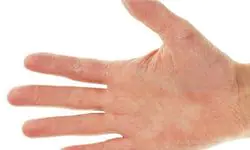
Dry hand skin
The most harmless reasons why the skin on your hands dries, itches and peels is the use of aggressive detergents without special rubber gloves, excessive hand washing, especially in hot water, and lack of gloves in cold autumn and winter.
Other factors that cause itching and dryness:
- Allergy to cosmetics: cream, lotion, body milk.
- Excessive passion for solarium.
- Abuse of insolation.
- Insect bites (mosquito, wasp, bee, mosquito).
- Parasite bites (scabies mite, bedbug, louse).
- Allergy to pet hair or clothing from which it is made.
- Micro abrasions, cracks, cuts.
- Dermatological diseases: dermatitis, eczema, psoriatic lesions, infectious and fungal infections.
- Persons suffering from mental illness with an obsessive desire to scratch their hands.
Dry skin on feet
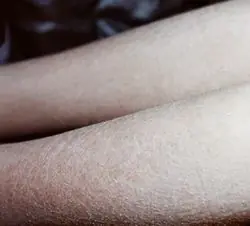
Dry skin on feet
Beautiful and well-groomed legs are the dream of every person. The more the skin dries and flakes, the more exposed it is to the environment. Reasons why the skin on your feet dries and itches:
- insufficient amount of moisture, dry air in the living room;
- loss of fluid due to illness with diarrhea, vomiting;
- exposure to high air and water temperatures (after taking a hot bath, shower);
- lack of vitamins A and E, then the skin of the feet is more susceptible to dryness and cracking;
- synthetic and woolen clothing materials (socks, tights, trousers);
- incorrectly selected shoes - tight, not the right size. Blood microcirculation and cell nutrition are disrupted;
- burns from plants, overheating in the sun;
- insect and parasite bites;
- long-term use of medications;
- regular stressful situations, depression;
- diseases of internal organs: renal and liver dysfunction leads to the accumulation of metabolites and irritation of peripheral nerve receptors with the release of inflammatory mediators, then symptoms arise when the skin is very itchy, scratching, and ulcerations appear. Endocrine system disorders with damage to the nerve fibers of the legs;
- Varicose veins;
- dermatopathies of the legs: fungal diseases, eczema, dermatitis and others.
Dry body skin
Dry skin on the body is usually caused by poor hygiene procedures, an allergic reaction, and diseases of the internal organs.
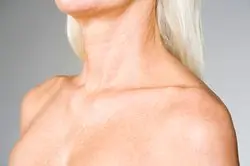
Dry body skin
Causes of unwanted symptoms:
- Allergic diseases associated with the intake of certain types of foods, flowering plants, dust, pet hair.
- Irritation and dryness of the body after taking a shower. Hot water provokes a sharp dilation of blood vessels and its influx. There is a term, aquagenic allergy, when in response to contact with water it provokes the release of histamine and prostaglandin from mast cells of the skin, as a result of which itching with swelling develops.
- Dry air, especially in winter, when it’s time for the heating season.
- Helminthiases.
- Senile itching - with age, cells atrophy and do not produce enough sebum.
- Liver failure.
- Itching during pregnancy during toxicosis.
- Psychoneurological diseases (psychoses, neuroses).
- After radiation and chemotherapy for malignant neoplasms.
In case of prolonged unpleasant sensations in the skin, dryness, itching and flaking, it is advisable to contact a specialist in order to make an accurate diagnosis and prescribe individual therapy.



